More real world dissent to Wall Street’s view that everything looks great for 2024.
On Thursday Cisco Systems (CSCO) shares closed down 9.83% after the networking giant offered up significantly weaker-than-expected guidance for 2024. Wall Street analysts called the guidance “disappointing.”
And the same day cybersecurity favorite Palo Alto Networks (PANW) dropped 5.42% after the company lowered its billings forecast for the fiscal 2024 year.
I’m not saying that this earnings news shows the U.S. economy plunging into recession in 2024. I don’t think that’s likely. But I would say that the recent Wall Street rally from the October lows seems to be overlooking significant risk ahead in sectors that range from chips to retail to software to Internet gear.
What did the two companies say?
Cisco Systems said the the company has been drawing down its order backlog faster than new orders are replenishing it. And that the draw down in 2023 that supported revenue and earnings is unsustainable in 2024.
Cisco said it sees full-year 2024 sales between $53.8 billion and $55 billion, down from a previous view of $57 billion to $58.2 billion due to a slowdown in new orders. Analysts were expecting $57.84 billion in full-year sales.
The company also sees fiscal 2024 earnings between $3.87 and $3.93 per share, excluding one-time items, below the $4.05 per share estimate.
It’s not so much the size of the cut in guidance that punished the stock, but the trend. The company said that the slowdown is likely due to the fact customers are focused on installing and implementing products after three quarters of strong product delivery.
At Palo Alto Networks the story was similar.For fiscal 2024, the company expects total billings in the range of $10.7 billion to $10.8 billion. That compares to a prior estimate of $10.9 billion to $11 billion. Revenue guidance went to a range of $8.15 billion to $8.20 billion versus the estimate of $8.19 billion. Non-GAAP net income per share is forecast in the range of $5.40 to $5.53 compared to the estimate of $5.34 per share.
The drop in the share price came in spite of a very strong earnings surprise for the first fiscal quarter. Revenue of $1.9 billion was above the average analyst estimate of $1.84 billion and non-GAAP earnings came in at $1.38 per share, above the estimate of $1.16 per share. (I would note that Palo Alto trades at 189 times trailing 12-month earning per share. Cisco’s PE is just 15.65.)
Both stocks are members of my long-term 50 Stocks Portfolio. Cisco Systems is an original member of that portfolio and has gained 196% since the inception of that position on December 31, 2008. Palo Alto is up 196% since it was added to the portfolio on January 22, 2020.



I wouldn’t read much into these companies poor earnings. These companies products aren’t price competitive. For a better read on the sector I’d watch Ubiquiti. They sell to the heart of the IT market. Cisco has been premium priced for years, and they sell like IBM. No one gets fired on staff for recommending CISCO. However, no one wins a competitive bid deploying CISCO.